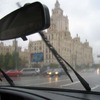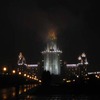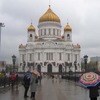Russia-Ukraine gas deal too murky for comfort
MOSCOW/KIEV (Reuters) - Europe may have breathed a collective sigh of relief after Russia and Ukraine signed a long-term gas supply deal, averting a possible repetition of the New Year supply cutbacks that unnerved the continent.
But after a closer look at the complex pact signed on Wednesday, outsiders may yet have cause for concern about the region's energy security, especially after Ukraine's ex-premier Yulia Tymoshenko launched a legal challenge to stop the deal.
The accord uses as middleman a little-known Swiss-based joint venture called RosUkrEnergo, owned half by Russia's gas monopoly Gazprom and half by Austria's Raiffeisen Zentralbank.
Sources familiar with the five-year gas deal say Raiffeisen is representing a group of mainly Ukrainian investors but their identity is shrouded in secrecy.
"We represent a group of international investors knowledgeable in the gas business who don't want to reveal their identity," Wolfgang Putschek, of the Austrian bank's investment arm, told Reuters by telephone from Vienna.
Until it is clear who is behind the company's business, uncertainty remains over who stands to profit from it and how exposed it might be to political interference.
"Ukraine cannot sign a contract where the middleman ... is a commercial structure when it declares it is a democratic and transparent European country," said Mykola Rudkovsky, a leader of Ukraine's Socialist Party, which is in the ruling coalition.
"Such schemes are very vulnerable to political changes," he told the Ukrainska Pravda Web site.
Putschek estimated RosUkrEnergo's 2005 sales at $3.5 billion (2.0 billion pounds) and profits at $500 million. He said its gas sales would rise in 2006 by 35-40 percent from last year's 40 billion cubic metres (bcm), making RosUkrEnergo one of Europe's top gas marketers.
CORRUPTION RISK
Critics say the non-transparent structure could easily lead to corruption, with money being siphoned off to private pockets, and that it would be better both for Ukraine and Gazprom -- the world's largest gas firm -- to deal directly.
RosUkrEnergo was set up by former Ukrainian President Leonid Kuchma's government shortly before it was ousted from power by a popular revolution after flawed elections, leading critics to fear also that it could be linked to political interests.
Within months of appearing from nowhere it had taken control of Ukraine's gas imports from Turkmenistan by the start of 2005.
During her brief tenure as premier of the reformist government swept to power in Ukraine's 2004 "Orange Revolution", Tymoshenko denounced RosUkrEnergo as a "criminal canker on the body" of state energy firm Naftogaz.
She vowed on Thursday to fight the deal in the courts, saying: "This agreement has put Ukraine into a situation of unstable gas prices. All these agreements should be cancelled."
PROBE
Tymoshenko and her ally and former security service chief, Oleksander Turchinov, investigated whether Semion Mogilevich -- a Ukrainian-born Russian businessman wanted by the U.S. Federal Bureau of Investigation for racketeering, fraud and money laundering -- was behind the Ukrainian side of RosUkrEnergo.
Mogilevich has, through his lawyer, denied any link and the investigation petered out after Tymoshenko and Turchinov lost their jobs last autumn.
Putschek also denied any connection to Mogilevich, saying RosUkrEnergo's backers were reputable. "Our standard procedure for accepting customers is that they have to undergo rigorous compliance checks, and they passed them," he said.
Ukraine is the transit route for 80 percent of Russia's gas exports to Europe. Polish gas company PGNiG is one customer of RosUkrEnergo, buying 2 bcm of Poland's annual needs of 13 bcm, industry sources in Warsaw say.
DEALING DIRECTLY
Under the deal, RosUkrEnergo will this year handle gas supplies to Ukraine from Russia and Central Asia, to be sold at an average $95 per 1,000 cubic metres -- up from around $50 now.
But the venture will buy from Gazprom at $230 per 1,000 cubic metres, meaning that part of its business will lose money. Sources said it would market gas to Hungary and Romania independently to make good the shortfall.
"In general we believe this is positive for Gazprom because the prices are higher. But at the end of the day it would be better if Gazprom did this business itself," said Vadim Kleiner at Hermitage Capital Management in Moscow.
Officials at Gazprom and in the Russian government say Russia's side of the bargain is sufficiently transparent, but they cannot influence the way the Ukrainians choose to operate.
"We know who owns the Russian side and we would rather the Ukrainians switched to direct state ownership," one Russian source said. "But that's how they wanted to structure the deal."
That would change, said Putschek, if RosUkrEnergo goes ahead with a planned initial public offering in the next 12-18 months, as it would have to disclose its owners in its issue prospectus.
"Then it would become clear," he said.
By Douglas Busvine and Elizabeth Piper
 Podium
Podium





